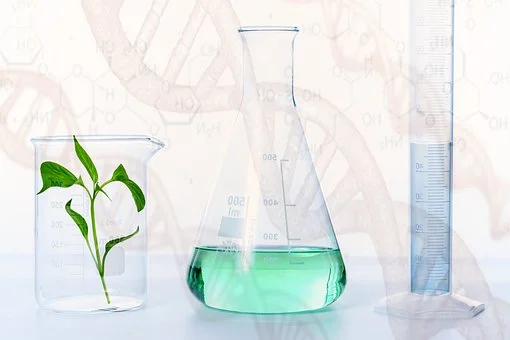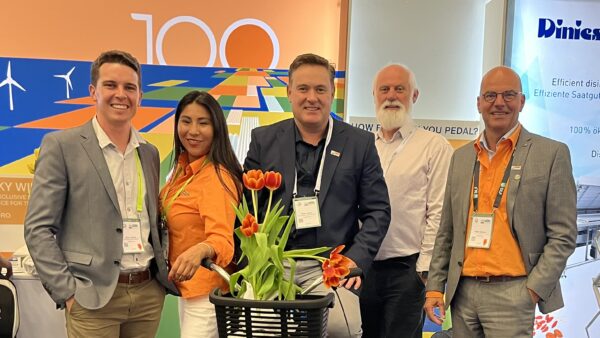Seed World Europe wishes you happy holidays. And while you’re having a great time with your families and friends over the holidays, there may be moments you’d like to take a break and escape with a bit of good reading. Check out our daily postings of content from the past year.
Editor’s Note: FAKE NEWS ON GMOs. If there is one topic in the plant breeding and seed sector that has generated a lot of myths, it is genetically modified organisms. Which is utterly surprising as these GM plants are all thoroughly checked with tests based on internationally agreed rules. They are declared fully safe and are not harmful in any way, raise yields, and have led to a decrease in the use of crop protection products, as a result of the added diseases resistances in these GM plant varieties. Check out our myth-busting piece on GMOs.
GMO stands for “genetically modified organism.” It most commonly refers to organisms — often plants — that have been modified to achieve desired traits, like drought-tolerance and pest-resistance, using recombinant DNA techniques or genetic engineering (GE). It’s a misleading term, since we’ve been modifying the genetics of organisms since the dawn of agriculture. But the name isn’t the only thing that people get wrong.
Myth: Farmers cannot save seeds of their GMO varieties
Fact: Farmers voluntarily agree not to save and replant patented GMO seeds since they are frequently protected by intellectual property laws. For many farmers, this is not a new problem because hybrid seeds, which have been available for decades, also need to be purchased each season because they don’t breed true. Farmers decide to buy these seeds in both situations because they obtain a better yield and earn more money.
Additionally, many GMO crops are available as a result of public-private partnerships, like the virus-resistant papaya in Hawaii, the insect-resistant eggplant in Bangladesh, and the drought-tolerant Water Efficient Maize for Africa, and no royalties are required.
Myth: GMOs are a corporate scheme to dominate the world’s food supply and developing countries
Fact: Developing countries have devoted more hectares to growing transgenic crops than industrialized countries for several years in a row, and they are increasingly choosing GMOs. Because these crops have increased the incomes of 18 million small-holder agricultural families, providing stability to more than 65 million people in developing countries, farmers in these countries prefer biotech crops to help fight hunger. The poor, who arguably stand to benefit the most from this technology, shouldn’t be left out.
Myth: GMOs cause an increase in the need for pesticides
Fact: Some genetically modified crops, like Roundup Ready corn or soy, can tolerate herbicides. This trait reduces the need for weeding and tillage, which disturbs the soil. GMO crops with a natural insect-resistance can minimize or eliminate the need for insecticides. Overall, according to scientists, the usage of pesticides, including insecticides and herbicides, has decreased by 37 per cent because of GMOs.
Myth: GMOs are only made by the private sector
Fact: Among other things, genetic engineering technologies can reduce the need for pesticides. Public sector scientists are currently working to increase the nutritional value and viability of major food crops important to their region, such as cassava, lentils, mustard, brinjal, potatoes, rice, and bananas, by breeding various GMO crops in developing nations. These crops are primarily grown by small-holder farmers to feed their family and sell in local markets.
Myth: GMOs haven’t undergone enough testing
Fact: Governments throughout the world follow strict biosafety guidelines to make sure that every new GM product doesn’t endanger the environment or the health of people or animals. These techniques call for extensive field and laboratory testing. A large majority of the hundreds of scientific articles that evaluated the safety of GM crops found that they are nutritionally equal to their non-GM counterparts.
Myth: GMOs have a negative impact on the environment
Fact: Farmers that cultivate GMO crops, such as soy and maize, require less tilling, which lowers soil erosion, topsoil loss, and fertilizer runoff. Additionally, they can grow pest-resistant GMO crops like Bt cotton, corn, and eggplant with significantly fewer insecticide treatments, benefiting both human and environmental health. More than 25 per cent of all greenhouse gas emissions are related to agriculture and its related land use. In general, GM crops have raised crop yields by 22 per cent, decreased the usage of chemical pesticides by 37 per cent, and increased farmer earnings by 68 per cent. Had GM crops not been grown in 2020, for example, an additional 23.6 billion kilograms of carbon dioxide would have been emitted into the atmosphere, which is the equivalent of adding 15.6 million cars to the roads.
Myth: GMOs are harmful to you
Fact: Throughout their more than 25 years on the market, GMO foods have a solid, safe track record with zero illness or death. Food produced from GM crops is safe to eat and poses no greater risk than eating the same foods that contain ingredients from crop plants which were bred using traditional plant breeding techniques. This has been confirmed by numerous regulatory agencies, national academies of science, scientists, and prominent health associations worldwide. From close to one thousand studies and publications, animal studies, allergenicity testing and North American and European health data covering 20 years of research, it was concluded that no substantiated evidence of a difference in risks to human health between current commercially available genetically engineered crops and conventionally bred crops exists.
Myth: There are no long-term health studies on GMOs
Fact: Many long-term health studies have been carried out on GMOs. Apart from the fact that GMOs have a long and safe track record, these crops are also extensively and repeatedly tested for both environmental as well as consumer safety. Such tests are reviewed by government agencies in countries around the globe. Since 1992, more than 40 government agencies have given their green light for the use of GMOs in food, feed and for cultivation. A 2010 study of the European Commission states, “the main conclusion, after more than 130 research projects covering a period of more than 25 years of research and involving more than 500 independent research groups, is that biotechnology, in particular GMOs, are not per se riskier than, e.g., conventional plant breeding technologies.”
Myth: GMOs are not natural
Fact: Humans have been selectively breeding plants and animals for countless millennia. The transfer of genes across various species by bacteria and viruses has been happening naturally for millions of years, and genetic engineering mimics this process.
Myth: GMOs won’t be able to feed everyone on this planet
Fact: No single plant breeding or agricultural system can or will sustainably feed 9 billion people. There is no “magic solution”. To assist in achieving this aim, a combination of conventional, organic and biotech agriculture is needed, as well as small-holder and large-scale farming systems. Transforming entire food systems, including better transport and storage systems, as well as reducing food loss and waste, will also be key to feeding a growing global population.
Myth: It is difficult to nearly impossible for GM crops and organic farming to coexist
Fact: The U.S., the nation with the most acreage dedicated to growing GM crops, is seeing a significant rise in organic farming. Many farmers grow GM crops, conventional crops, and grow organically on their farm, depending on the crop and the economics and markets available to them. It’s important to note the IFOAM World Board’s opinion in May 2002: “[…] The potential of GMO contamination does not alter the traditional approach of certifying organic as a “production method” rather than an end-product guarantee. Organic products are not defined or certified as being ”free” of unwanted pollution […].













